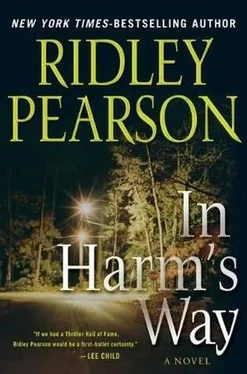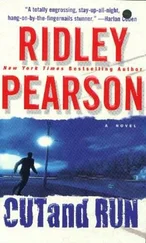He told himself he was merely preserving evidence, was hiding it so that no one would know of its existence, so that there could be no possibility of it leaking to the press before he’d had it properly recorded and analyzed. So that whatever evidence it provided could be used effectively and properly before it was misused and abused in the court of public opinion.
He was not withholding evidence. Not doing anything wrong.
But then why had he hidden the bat from Gilly? Why had he secreted it in the back of his Jeep rather than record its location with a photograph-SOP for a first officer’s discovery of any suspected murder weapon?
He shut the hatch as Fiona emerged into the glow of the Jeep’s headlights. From behind her appeared Barge Levy carrying a heavy backpack in his right hand. And then, a moment later, two deputies, one of them Tommy Brandon.
“Sheriff,” Fiona called out, juggling two camera bags. She looked skeletal in the pale light. Fragile and pale and exhausted as she hurried ever closer.
“Ms. Kenshaw,” Walt said, his voice breaking.
The digital clock on the kitchen microwave read 3:07. Walt was forced to decide whether or not to wake Lisa, and he’d ruled in favor of giving her a chance to sleep at least part of the night in her own bed. She drove off in her robe and jeans, bleary-eyed but grateful for the chance to get home.
With her out of the house, he pulled the blue bundle from the vehicle and walked it around to the privacy of the back door, never doubting for a moment that he might be watched. He’d long since learned two things in law enforcement: everyone carried at least one damaging secret, and there was no such thing as privacy.
With the blinds drawn, he carefully unfolded the tarp and stared at the bloody bat, wondering what the hell he was doing. He had a variety of excuses at the ready: he was protecting the investigation from a leak that could potentially strengthen Wynn’s defense (though the inscription to Michael Engleton made that a difficult angle); he was keeping the first real significant evidence away from any chance of public exposure; he was sequestering evidence to allow himself to pursue a methodical investigation and interrogation of suspects-most notably, Kira Tulivich. Convinced that he was okay as long as he didn’t contaminate or destroy evidence, he wrapped the bat carefully in cling wrap, then secured it with tape.
He hunted around in the garage and came up with an oversized cardboard box and cut it down to size with a razor knife and crudely shaped it to fit the bat. He used bubble wrap and newspaper and packaged the bat in the box, sealing it with more packing tape. He went online and filled out an overnight shipping label, printed it up, and left the package on the dining-room table as a shrine to his misbehavior.
Boldt had offered his help in speeding up the processing of evidence. The Meridian lab might expedite the work because of its association with a possible homicide, but Walt could overlook that possibility and send it to Boldt with a decent excuse in his back pocket. One day to reach Seattle, one day to process. He should have results in less than forty-eight hours, about the quickest he could expect it from the state lab in Meridian. But by putting it onto Boldt’s books he maintained absolute privacy, something that could play heavily in his favor in the days to come. In the event the bat implicated someone of interest to Boldt in the Vetta investigation, then his use of the Seattle lab was further justified.
But he didn’t sleep well that night. He tossed and turned, and what little sleep he found was marred with bad dreams and tangled plot lines that kept him barely below the surface. He awoke irritable and tired and got the girls off to camp in a cloud of silence they could feel. Even Beatrice kept her distance, lying with her head on her crossed paws, her eyes never leaving him.
“Stop it!” he called out to her across the room as he cooked French toast. She blinked, looked away, then refocused on her master, his four-legged conscience refusing to let him go.
At ten a.m., Walt left the office without explanation, telling Nancy only that he was heading home and would be back in fifteen minutes.
Nancy associated such unexplained departures with family or health issues, both of which worried her, as in her mind she’d taken on the role of his guardian since the divorce. She often handled personal matters for him that had nothing to do with his job.
“Everything all right?” she’d asked, a question he didn’t have to answer given the expression he wore.
“Fine,” he lied.
“If I can help,” she added, causing him to slow down, debating either a reprimand or an apology. She received neither. He continued out the door, his eyes locked ahead of him like a marching soldier.
“Sorry to call so early,” Walt said, Boldt’s face filling the small window on his computer screen.
“Up for hours,” Boldt said. “What can I do for you?”
“Am I that transparent?”
“You’re using Skype,” Boldt said, “instead of the phone. But I’m glad you called. Matthews had an explanation for us.”
“Concerning?”
“First, why don’t you tell me why you called?”
Walt kept his explanation of shipping the bat short and simple-he needed the lab work expedited. No excuse; no reasoning offered. He’d appreciate a phone call or e-mail the moment they knew anything. Boldt took it all in stride.
“Now you,” Walt said.
“The girl at the nursery,” Boldt said. “What was her name?”
“Martha Sharp. Maggie.”
“Pot. Matthews says she’s growing pot out there. She’s working it at night when she doesn’t belong there, which is why she was so sensitive about not being there after hours. She’s doing this on her own to supplement her income. She lives alone, probably with one of her parents who is ill or relies upon her. We scared the hell out of her by nosing around, but the point is, Matthews thinks she probably saw something. With Gale, I mean. I described the interview and-this is her magic, Sheriff-she jumps in and starts to break it down for me. I know it may sound like hocus pocus, but this is what she does, and I’ve learned to trust her.”
“Pot.”
“Underground, maybe. Lights. But the point is: she was there. She saw something and is withholding it because she can’t explain her being out there at all hours. Matthews said the approach is to get to her need for this money, identify and undermine her need. You establish the need, then you point out the ramifications to the need if she’s busted for growing. The parent or sibling will suffer if she goes down. You trade burning her stash for what she knows, and everyone wins.”
“And you’d go with this?” Walt asked skeptically.
“You’ll meet her someday. Matthews. She’s… well, she’s one of a kind. I’d give this a seventy-five percent chance. She’d probably give it less than that, but that’s how she is: modest to a fault.”
“You’ll call me?”
“The minute I hear from the lab.”
Walt bypassed the sacred doctor-patient privilege by avoiding the doctor altogether and appealing straight to the hospital’s comptroller, a man who served with Walt on Search and Rescue. The phone call took all of five minutes, and by the time he reached the nursery, he had what he needed without having to coax it out of Maggie Sharp.
“Your mother’s dialysis,” he said before even addressing the woman. Behind him deputies Milner and Tilbert leaned against the grille of their cruiser.
Maggie Sharp gnawed on a fingernail. Couldn’t keep her eyes from wandering to the two deputies. She said nothing.
“Your employer need not know,” he said, surprising her. “It won’t be in the papers. You’ll get off with some community service and even that will be kept off the books. Meaning no criminal record. This is a one-time offer. If the information you give me is good enough, if you tell me the truth about what you saw that night and don’t try to give me the runaround, then my guys won’t go tearing up every tree and plant and making a mess of this place. This is a critical decision you’re about to make, Maggie. It has far-reaching implications that will not only affect you but your mother and all your loved ones.”
Читать дальше












